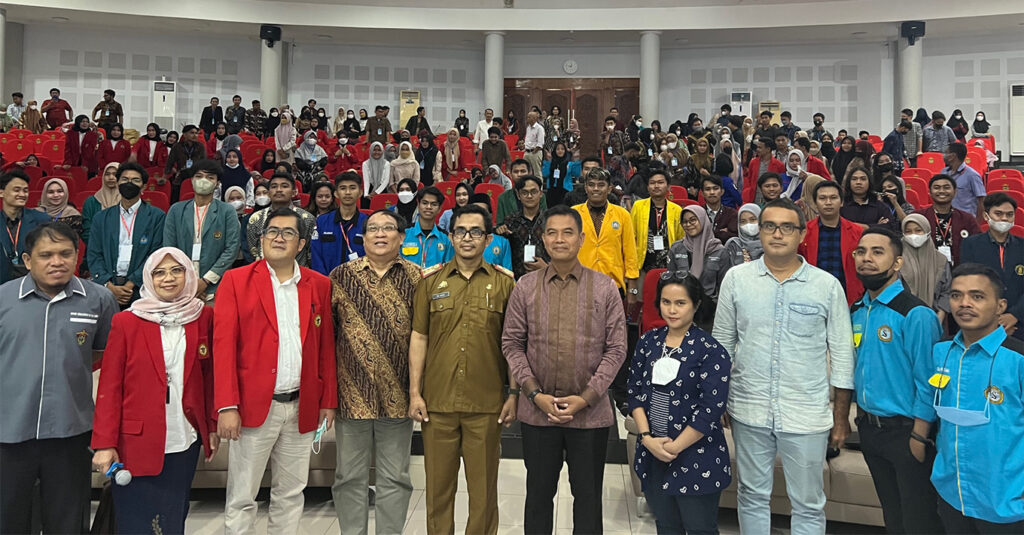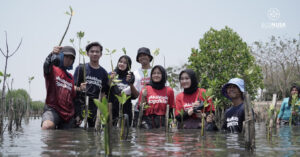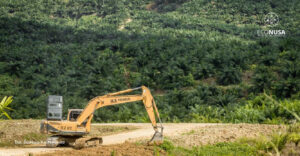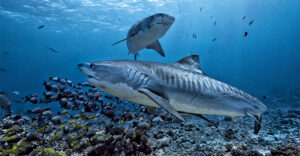
Blue Economy highlights the systematic innovation, technology, and optimum utilization to uphold added values of fisheries product. This could happen by creating policy at upstream level and build the human resource capacity. It does not simply sell raw product.
The statement was addressed by Rizal Idrus, the lecturer of Hasanuddin University (Unhas)’s School of Marine and Fisheries, in a National Seminar on “Blue Economy and Fisheries Revitalization” held by Hasanuddin University on 6 June 2022. The seminar is the series of event from the coordination meeting of Indonesian Association of Fisheries Students (HIMAPIKANI) on 5-10 June 2022 in Makassar, South Sulawesi Province.
“Local wisdom important role should also be promoted to have more roles and become the reference of conservation endeavor,” said Rizal.
Read Also: Measured Fishing Policy Overlooking Ecosystem and Fishers Welfare
As to him, the blue economy framework promoted by the National Development Planning Agency (Bappenas) admitted the significance of community engagement regarding the substantial role of coastal community that has so far practiced sustainable economy activity and produced various social benefits.
The blue economy development framework for Indonesian economy transformation has been arranged by Bappenas in 2021 in a document entitled “Blue Economy Framework for Indonesia’s Economic Transformation”.
The blue economy development is to optimize Indonesia modality as the archipelagic country with the diversity of sea resources and strategic politic-economic position among neighboring countries. The management of sea resources and ecosystem is to cope with degradation, climate change, and pollution challenges as well as social economy vulnerability among coastal community affected by the various change of sea and coastal ecosystem.
Read Also: Raimuti Island, The Stunning Island is Sinking
In response, Mida Saragih, the EcoNusa’s Ocean Policy Specialist, said that there will be inclusive and sustainable blue economy in the future. In particular, it is important to have recognition of indigenous people and coastal communities in sea resources management in Indonesia. Many coastal communities and traditional fishers have practiced sustainable utilization in traditional way such as sasi in Maluku and egek in West Papua.
In this light, community livelihood should be put as the core of state accountability to protect, revitalize, and defend sea resources for the next generation. “By supporting natural and cultural conservation practices we promote sustainability and people’s welfare,” said Mida.
Mida added that in blue economy, the plan for Measured Fishing Policy which allows foreign capital investment and foreign business entity to get utilization contract should be taken into serious consideration. Let alone, fish resources are prone to exploitative practices as it deals with the lives of many people.
“Besides, it needs comprehensive consideration as it does not merely deal with economic aspect but also people and sustainability aspects that needs explicit state regulation,” added Mida.
Read Also: Blue Ecomic Implementation Not Optimum
HIMAPIKANI National Seminar presented Mida Saragih, the EcoNusa’s Ocean Policy Specialist, Ridwan Mulyana, Ministry of Maritime Affairs and Fisheries (MoMAF)’s Catch Fisheries Director General, Muhammad Ilyas, Fish Resources Management Director, Head of South Sulawesi’s Maritime and Fisheries Office, and Rizal Idrus, the lecturer of Hasanuddin University’s School of Marine and Fisheries Science. The dean and 111 members of HIMAPIKANI from campuses nationwide also attended the event.
In response, HIMAPIKANI Secretary General, Jan Tuhuteru, said that fisheries sector should be managed in sustainable way to go along with blue economy goals. It is time for the government to focus on the recovery of national fish stock from its critical conditions in some Fisheries Management Areas (WPP). It is intended to transform the red indicator of fish stock (over exploited) into yellow (fully exploited), and then turns into green (moderate).
“It is expected that the catch fisheries productivity is well maintained and even increased so as to provide welfare to our fishers,” said Jan.
Read Also: Illegal Fishing Practice Still Rampant in Indonesian Oceans
Indonesia is very potential to promote transformation and diversification of blue economy. Sea-based sector and fisheries resources have given significant contribution to the country economic dynamics. However, Indonesia should have a better sea management. The Ocean Health Index (OHI) 2020 puts Indonesia on the 137 th as from 221 countries. It implies that sea sector activities are mostly driven by sea food harvesting and tourism practices that are not in sustainable way. Various sectors including pollution, particularly plastics and climate change impact that degraded sea ecosystem have affected sea ecosystem health and major economy sector such as tourism and fisheries.
EcoNusa jointly with some civil society organizations in KORAL has criticized the measured fishing policy that promotes quota based fishing system and open contract to foreign business entity as well as foreign capital investment.
KORAL also gave recommendations to MoMAF to bolster oversight, provide catch fisheries license, strengthen science-based recommendation for fish stock studies, and close fishing activity from foreign ship intrusion.
KORAL consists of Indonesia Ocean Justice Initiative (IOJI), Pandu Laut Nusantara, EcoNusa, KIARA (Koalisi Rakyat untuk Keadilan Perikanan/People Coalition for Fisheries Justice), WALHI (Wahana Lingkungan Hidup Indonesia), Greenpeace Indonesia, ICEL (Indonesian Center of for Environmental Law), Destructive Fishing Watch (DFW), and Yayasan Terangi.
Editor: Leo Wahyudi & Lutfy Putra







